Click on images to enlarge
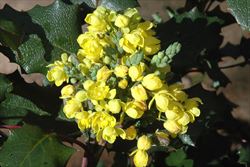
flower cluster (Photo: Rob and Fiona Richardson)
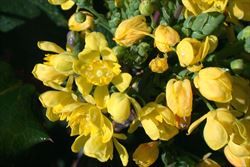
close-up of flowers (Photo: Rob and Fiona Richardson)
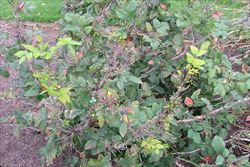
habit (Photo: Sheldon Navie)
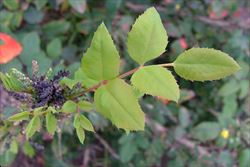
young leaves (Photo: Sheldon Navie)
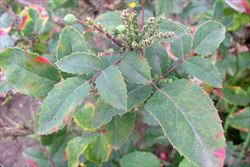
older once-compound leaves (Photo: Sheldon Navie)
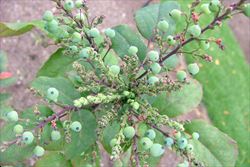
immature fruit (Photo: Sheldon Navie)
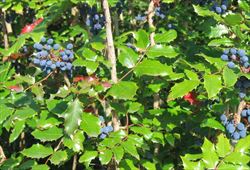
Ripe fruit, by the original uploader was Meggar at English Wikipedia (Transferred from en.wikipedia to Commons.) [GFDL (http://www.gnu.org/copyleft/fdl.html) or CC-BY-SA-3.0 (http://creativecommons.org/licenses/by-sa/3.0/)], via Wikimedia Commons
Scientific Name
Berberis aquifolium Pursh
Synonyms
Mahonia aquifolium (Pursh) Nutt.
Mahonia leschenaultii auct. non (Wight & Arn.) Takeda
Mahonia pinnata auct. non (Lag.) Fedde
Family
Berberidaceae
Common Names
blue barberry, grape holly, holly barberry, holly mahonia, hollyleaved barberry, mahonia, mountain grape, Oregon grape, Oregon grapeholly, Oregon mountain grape, tall Oregon grape
Origin
Native to western Canada (i.e. southern British Columbia) and western USA (i.e. Idaho, Montana, Oregon, Washington and northern California).
Naturalised Distribution
Naturalised in some parts of eastern Australia (i.e. naturalised in southern New South Wales and south-eastern South Australia, sparingly naturalised in Victoria and possibly naturalised in the ACT).
Also naturalised in eastern Canada, Europe and New Zealand.
Notes
Oregon grape (Mahonia aquifolium) is regarded as a potentially serious environmental weed in south-eastern New South Wales and as a sleeper weed in other parts of south-eastern Australia. This species produces small grape-like fruit and its seeds are dispersed into natural areas by birds. It is relatively slow-growing but is clonal and can eventually form dense colonies of vegetation that replace native species and prevent their regeneration.
Oregon grape (Mahonia aquifolium) is tolerant of shade and normally grows in the forest understorey in its natural habitat. It is regarded as an aggressive invader of forests in central Germany, and has the potential to invade similar forest habitats in Australia.

